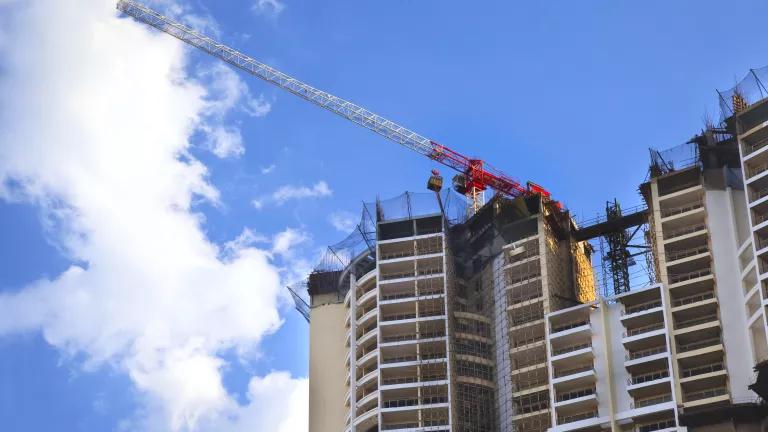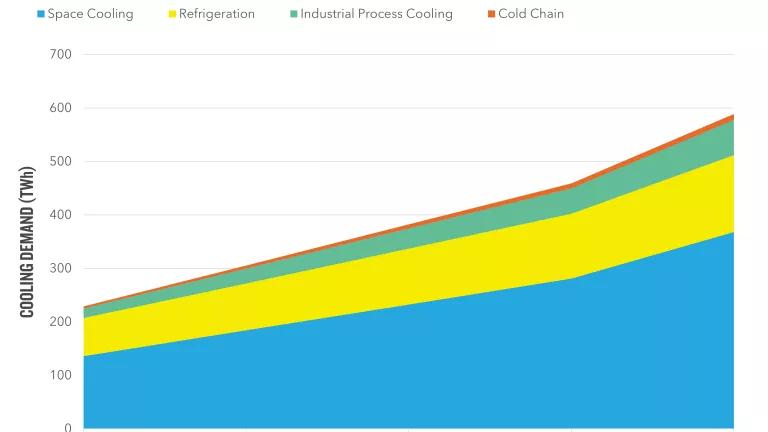More States Adopt Building Energy Codes in India
In a boost for energy efficient buildings, Chhattisgarh and Rajasthan adopted the Energy Conservation Building Code (ECBC) 2017 last month. Building energy codes are effective tools to ensure energy efficiency in the construction and operation of buildings.

High-rise residential housing under construction in India.
iStock
Co-authored with Ashish Jindal
In a boost for energy efficient buildings, two more states in India, Chhattisgarh and Rajasthan, adopted the Energy Conservation Building Code (ECBC) 2017 last month. This was a move that could potentially lock in energy savings for years to come. Buildings in India already account for nearly 30% of total electricity consumption and are expected to increase to 48% by 2042. With India projected to add 1-billion square meters of new commercial floor space by 2030, building climate-smart from the start provides a real opportunity to save energy, reduce emissions, and enhance prosperity.
Building energy codes are effective tools to ensure energy efficiency in the construction and operation of buildings. Since 2007, the Ministry of Power’s Bureau of Energy Efficiency (BEE)’s ECBC (amended later in 2017), which sets minimum efficiency standards for new commercial buildings, has acted as a model for states to modify, adopt, and implement energy codes as a state law. The ECBC has the potential to transform the way buildings are constructed, and could save 25% to 50% of energy use in buildings. To date, 23 states have notified the ECBC.

India’s Energy Conservation Building Code for Commercial Buildings.
Chhattisgarh and Rajasthan Notify the ECBC 2017
States play a critical role in notifying, adopting, and implementing building energy efficiency codes. While the central government has the power to prescribe ECBC under the Energy Conservation Act 2001, the state governments have the flexibility to modify the code to suit local or regional needs and adopt the code.
The state of Chhattisgarh recently adopted the Chhattisgarh Energy Conservation Building Code (CGECBC), a state amended version of the ECBC 2017 for composite & warm humid climatic zones. The state’s code covers hospitality, education, shopping facilities, hospitals and more. Starting this year, around 500 newly constructed commercial buildings each year in the state will be compliant with ECBC by 2030, saving about 3 million tonnes of CO2 (Source: estimates by CREDA).

Chhattisgarh Energy Conservation Building Code.
The state of Rajasthan has also made progress by updating its building energy code to ECBC 2017. While the state notified an earlier version of the ECBC over a decade ago, implementation has been modest. Now, under fresh notification, there is a renewed opportunity to design and implement an efficient well-functioning ECBC compliance framework, based on the lessons learned to date.
Implementation is Key
Notification of state energy codes is a big milestone. However, this milestone needs to be followed with robust implementation to ensure energy savings are accrued with new building construction. In Chhattisgarh, for example, the Chhattisgarh Renewable Energy Development Agency (CREDA) is leading the state’s efforts to implement building energy efficiency. CREDA and its ECBC Cell (Design2Occupancy Services LLP) is now actively working with other state departments and stakeholders such to develop a robust implementation framework to support ECBC adoption in new buildings. Under one such effort, CREDA, in partnership with Administrative Staff College of India (ASCI) and NRDC India, organized a knowledge exchange visit to the state of Telangana, which has been successfully implementing the code since 2018. Telangana’s model offers significant lessons on ECBC implementation, which is based on creation and adoption of Third Party Assessor (TPA) model of implementation. This model focuses on the creation of a local pool of experts working both with the government and the real estate developers, which supports enforcement of the code. Chhattisgarh will be working closely with ASCI and NRDC in the coming months to design this framework, including training local architects, engineers, building consultants through Chhattisgarh Technical University to become certified professionals for ECBC.
“Constructing energy efficient buildings in Chhattisgarh through implementation of CGECBC-2022, is a significant contribution in fulfilling India’s NDCs, Sustainable Development Goals and Lifestyle for Environment (LiFE) Mission commitments. Adoption of building energy efficiency as a State Policy will avoid locking in inefficient building stock for the next 30-50 years and thereby contribute to the nation’s energy security.” Rajeev Gyani, Superintending Engineer, CREDA.
Looking Ahead
Of the remaining states yet to notify ECBC, Gujarat and Maharashtra are the largest. Gujarat is a leading industrialized state in India and could save nearly 83 terawatt-hours (TWh) of energy by 2030 with effective ECBC compliance. Maharashtra, the largest state economy in India, has taken initial steps to draft a state amended code. A lot is left to be done to implement the code—starting first with notification of the code in these two states.
Further strengthening action on building energy efficiency, in December 2022, India enacted the Energy Conservation (Amendment) Act, 2022, which provides a strong policy framework for energy efficiency in India. This Amendment of the act also makes residential building energy codes (ECO Niwas Samhita) mandatory. With many lessons learned from the commercial segment, the shift to build more energy efficient residential buildings will help support a climate smart India. Constructing more efficient buildings is a central strategy to achieve India’s climate targets laid out in India’s revised Nationally Determined Contributions (NDCs) and India Cooling Action Plan.





